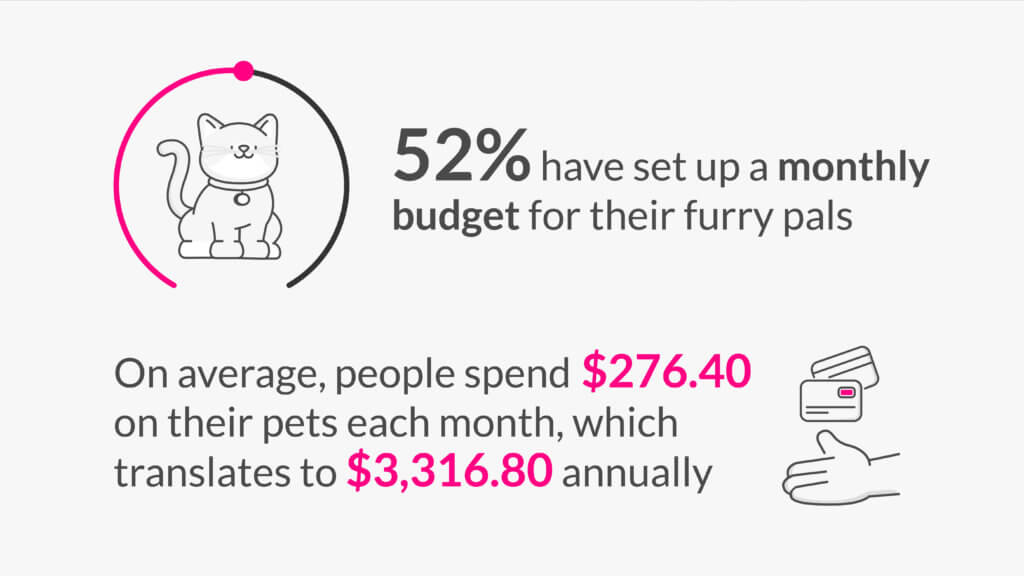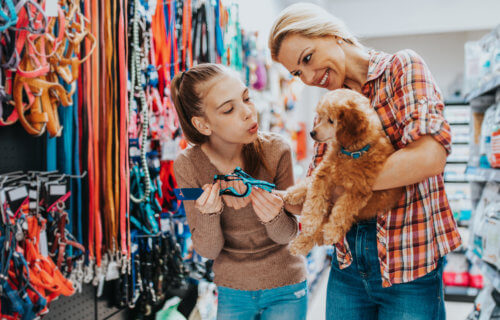NEW YORK — If you want to own a pet, then be prepared to have an annual budget of over $3,500 for their essential needs. A new study of 2,000 pet owners – including 1,000 dog owners and 1,000 cat owners – reveals that half of all respondents have set up a monthly budget for their pets (52%) with an average cap of $308.
In reality, pet owners, on average, spend $276.40 on their furry pals each month, which translates to $3,316.80 annually.
While nearly all respondents have gone over their monthly budget (98%), four in five admit they actually “don’t care” (79%), showing their true dedication to their furry friend.
So, what causes pet owners to splurge?
Pet care (37%), emergency vet visits (35%), upgrading their pet’s home situation and taking care of annual or ongoing medical needs (both 33%) are all among the main reasons people spend more.
Conducted by OnePoll on behalf of Lemonade, the research also found that 45 percent of all pet owners think dogs are more expensive than cats, 13 percent think the opposite, and 42 percent think they’re both equally costly. Respondents think dogs are expensive because the food (54%), vet checkups (52%), medicine (50%), grooming (46%), and cleaning products (38%) are pricey.
On the other hand, people think cats are pricier due to expensive food (41%), vet checkups (40%), bedding (38%), cleaning products (38%), and grooming (38%).
When people do splurge on their pets, owners go all out – citing that they have bought them trendy items, such as all-natural pet food (38%), raw pet food (31%), a modified home like a “catio” (29%), pet-friendly baked goods and desserts (28%), and pet tech like a smart collar (25%).

Pampering – but no pet insurance?
Despite all this pampering, the research suggests that more than half (55%) don’t have an insurance policy for their furry pals, citing cost as the main challenge (41%). Out of the 45 percent whose pets have insurance, owners researched an average of three policies for their furry companions before selecting the best match.
Two in five (41%) realized they needed to purchase an insurance policy for their pets from the day they got them. The same percentage listed an emergency visit or surgery as the top reason they got one in the first place.
Regardless of whether their pets have insurance, three in four owners agree that it’s important to plan for their dog or cat’s end-of-life care (75%).
“There’s no doubt that bringing a pet into your home can add immense unconditional love, but it’s important to understand they do come with a cost,” says Dr. Stephanie Liff, vet health expert at Lemonade, in a statement. “Whether it’s a routine vet visit, food, toys, or an emergency surgery, pets have financial needs that can add up. Being prepared and knowing your options, whatever that looks like for an individual owner, is crucial to have in place before there is an issue that becomes a heavy financial burden.”
Pet owners unaware of how much procedures cost
Four in 10 respondents have gone into debt because of their pets’ emergency needs (42%). Procedures and care can get expensive for pets and, according to the results, many pet owners are fairly unaware when it comes to how much they cost. For example, 41 percent of pet parents think something like dental work for pets costs between $101 and $500. In reality, a routine dental cleaning, on average, costs somewhere between $500 and $1,000, with more complicated dental procedures costing up to $3,000.
A third of respondents think expensive cancer treatments and surgery cost as low as $501 to $1,000, when in reality, according to Lemonade, some dog or cat surgeries can easily cost $5,000 or more, with a full round of cancer treatments setting pet parents back $10,000.
Meanwhile, many pet parents think flea treatments (36%) and vaccinations (34%) cost between $101 and $500, but in reality, flea treatments are around $15 per month and vaccines cost up to $50 per dose.
“Insurance doesn’t need to be intimidating, but it is important to do your research and find the best solution for your family,” adds Dr. Liff. “Look for plans that are customizable to ensure you’re paying for what you really need, are easy to understand, and can get you the help you need when you need it.”
